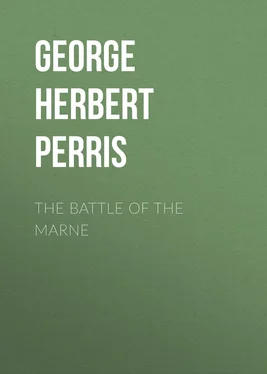George Herbert Perris - The Battle of the Marne
Здесь есть возможность читать онлайн «George Herbert Perris - The Battle of the Marne» — ознакомительный отрывок электронной книги совершенно бесплатно, а после прочтения отрывка купить полную версию. В некоторых случаях можно слушать аудио, скачать через торрент в формате fb2 и присутствует краткое содержание. Жанр: foreign_prose, foreign_antique, на английском языке. Описание произведения, (предисловие) а так же отзывы посетителей доступны на портале библиотеки ЛибКат.
- Название:The Battle of the Marne
- Автор:
- Жанр:
- Год:неизвестен
- ISBN:нет данных
- Рейтинг книги:5 / 5. Голосов: 1
-
Избранное:Добавить в избранное
- Отзывы:
-
Ваша оценка:
- 100
- 1
- 2
- 3
- 4
- 5
The Battle of the Marne: краткое содержание, описание и аннотация
Предлагаем к чтению аннотацию, описание, краткое содержание или предисловие (зависит от того, что написал сам автор книги «The Battle of the Marne»). Если вы не нашли необходимую информацию о книге — напишите в комментариях, мы постараемся отыскать её.
The Battle of the Marne — читать онлайн ознакомительный отрывок
Ниже представлен текст книги, разбитый по страницам. Система сохранения места последней прочитанной страницы, позволяет с удобством читать онлайн бесплатно книгу «The Battle of the Marne», без необходимости каждый раз заново искать на чём Вы остановились. Поставьте закладку, и сможете в любой момент перейти на страницу, на которой закончили чтение.
Интервал:
Закладка:
In the General Staff instructions of October 28, 1913, the doctrine had received its extremest expression. The milder instructions of 1895 were condemned as based upon the “most dangerous” idea that a commander might prefer defence on a favourable, to attack on an unfavourable, ground. “In order to avoid all misunderstanding on so important a point of doctrine, the new instructions admit only a single justification for the defensive in combat, that is, the necessity of economising troops on certain points in order to devote more forces to attacks; so understood, the defensive is, properly speaking, no more than an auxiliary of the offensive.” “The offensive alone leads to positive results”; this is the sole permissible rule governing the conduct of operations. Attacks must be pressed to the extremity without arrière-pensée or fear of heavy losses: “every other conception must be rejected as contrary to the very nature of war” (art. 5). “A Commander-in-Chief will never leave to his adversary the priority of action on the pretext of waiting for more precise information; he will, from the beginning of the war, stamp it with such a character of violence and determination that the enemy, struck in his morale and paralysed in action, will perhaps find himself compelled to remain on the defensive” (art. 6). “All the decisions of the command must be inspired by the will to seize and keep the initiative”; and they must be pursued “even if the information collected up to then on the forces and dispositions of the enemy be obscure and incomplete.” The plan should, indeed, be supple, so that changes can be made according to new information; but “success in war depends more on perseverance and tenacity than on ability in the conception of the manœuvre” (art. 15). “The French Army,” added the Commission which elaborated these rules, “returning to its traditions, now admits in the conduct of operations no law other than that of the offensive.”
Fortunately, no code can do more than hamper the natural elasticity of the French mind. But the direction of the armies from top to bottom, and even the traditional aim of keeping in hand a mass of manœuvre, which had figured strongly in the teaching of Foch and other military writers of ten or fifteen years before, were affected by the current prescriptions of the Staff. We cannot here attempt to trace the growth of the perversion. The spirit of the French command on the eve of the war is, however, sufficiently evidenced in its actual dispositions; and we know that it threw its only mass of manœuvre (the 4th Army) into the Belgian Ardennes in the third week of August, and had to fight the battle of the Marne without any general reserve. In brief, along with every arm and method of defence, the service of information, the preparation of battle, and the art of manœuvre—which is irreconcilable with a dogma of universal and unconditional attack—were depreciated and prejudiced. 13In the strength and weakness of this creed, France entered the war.
The results in the lesser commands were serious enough. Speaking of the advance into the Ardennes, M. Hanotaux, in general an apologist of the old school, says that it was conducted “in an extremely optimistic mood,” that “mad bayonet charges were launched at a mile distance from the enemy without artillery preparation,” and that, “doubtless, the spirit of the offensive, ill-regulated and ill-restrained, among officers as well as men, was one of the causes of our reverse.” Officers and men took only too literally the rules on which they had been trained. Strengthened by the general belief in a short war, and by an exaggerated idea of the importance of first results, a like infatuation governed the strategy and the tactics of the French armies. A succession of surprises marks the light regard for information of the enemy’s means and movements, as a series of instant reverses measures the scorn for well-pondered manœuvre. Was France required by her Eastern ally to attack at once? The attack need not have surpassed the proportions of holding actions punctuating a stout defence. Was Belgium closed to the French armies by the old treaty of neutrality? That did not justify a plan of campaign which left the north uncovered to a German aggression. For all that followed from disunity of the Allied commands, England and Belgium share the responsibility. Had they, as well as Russia, been long in alliance, and Italy’s neutrality assured in advance, all might have gone otherwise; probably, indeed, there would have been no war. These circumstances do not afford excuse for a radically unsound conception of the danger and the reply.
A German attack through Belgium had been much and long discussed. If few would have said before the event, as the German Chancellor and Foreign Secretary pleaded immediately afterward, that it was “a question of life and death for the Empire,” “a step absolutely required,” it was at least more than probable; and we have Marshal Joffre’s word for it that the contingency was contemplated by the French Staff. 14But two doubts remained, even in vigilant minds. Would the invasion by the north be large or small, and would it be more or less extensive, proceeding only by Belgian Luxembourg and the Meuse valley, or also by a more daring sweep across the Flanders plain into the valley of the Oise? Moltke had advocated a march to the North Sea coast, and a descent by the Channel ports, through the trouée of the Oise, upon Paris, turning not merely the principal line, but the whole system, of the French fortresses. Bernhardi had toyed with the idea of an even more extensive movement, violating Dutch territory, but seemed at last to favour the more limited project, “the army of the right wing marching by the line Trêves–Stenay, crossing Luxembourg and southern Belgium.” In fact, neither of these ways was taken. The invasion pursued a middle route, Holland being avoided, the descent upon the coast deferred, and armies thrown across both the Flanders plain and the difficult country of the Belgian Ardennes.
Notwithstanding the advertisement of the Kaiser’s chief Ministers in their famous pleas in justification, on the first day of the war, the French Staff do not seem to have anticipated anything more in the north than an attack by Luxembourg and the Ardennes, or to have altered their dispositions to meet it until the middle of August. We do not yet fully know what are the reasons for the arrest of the German offensive after the effective reduction of Liège, until August 19. Instead of six days, with, perhaps, three more for re-concentration, the German right wing took sixteen days in crossing Belgium. As this week of Belgium’s vicarious sacrifice saved France, it cannot be supposed to have been a voluntary delay made simply for the purpose of deceiving the Allies. It had that effect, however. Thwarted at Liège, the German command did everything it could to conceal the true nature of the blow it was about to deliver—by terrorising the population and occupying the mind of the world with its atrocities, by the ubiquitous activity of its cavalry screen, by avoiding Western Flanders and the coast, and by holding up the advance of its first three armies behind the line of the Gette and the Meuse till everything was ready. The Allies altogether failed to pierce the veil of mystery covering the final concentration. They were deceived (1) as to the main direction of the coming onslaught, (2) as to its speed, (3) as to its power in men and armament. General Sordet’s cavalry got little information during their Belgian wanderings; the few French aviators still less. No doubt, the Allies hoped for a longer Belgian resistance, especially at Liège and Namur, as the enemy expected a shorter. The French Staff clung blindly to its belief that it need expect, at most, only an attack by the Meuse valley and the Ardennes. 15
Читать дальшеИнтервал:
Закладка:
Похожие книги на «The Battle of the Marne»
Представляем Вашему вниманию похожие книги на «The Battle of the Marne» списком для выбора. Мы отобрали схожую по названию и смыслу литературу в надежде предоставить читателям больше вариантов отыскать новые, интересные, ещё непрочитанные произведения.
Обсуждение, отзывы о книге «The Battle of the Marne» и просто собственные мнения читателей. Оставьте ваши комментарии, напишите, что Вы думаете о произведении, его смысле или главных героях. Укажите что конкретно понравилось, а что нет, и почему Вы так считаете.










